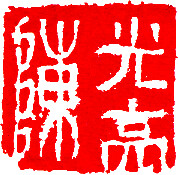|
Sunday, May 02, 2004
warrior monks

Now there were two warlike monks, famous among the Three Pagodas, who lived together at the Zenchibo Cloister in the South Valley of the East Pagoda, and their names were Gokan and Gosen. As these were being carried along unwilling toward North Shirakawa by the great size of their army (the Mountain Gate monk army was retreating before the Western horde), Gokan called out to Gosen to stop him, saying: "There are times when one wins and times when one loses, since such is the way of warfare. Nor is there any shame in something which depends upon the luck of the moment. Yet because today's battle was such as might allow the realm to mock at the Mountain Gate, let us go back together to meet the enemy and die, that by sacrificing the lives of two men we may wipe out the disgrace of the Three Pagodas." So he spoke, and Gosen said: "Is it needful to speak? I would like nothing better." Stopping their feet before the north gate of the Hosshoji, these two named their names in a mighty shout, saying: "Well may you know that we are the bravest men of the Three Pagodas, since we turn back alone from the great host drawing us along. Doubtless you have heard our names! We are known to the entire mountain as Gokan and Gosen, residents of the Zenchibo Cloister in the South Valley of the East Pagoda. Draw near, self-confident warriors! Use your forged weapons to provide a spectacle for the men of your army!" So they spoke, whirling their great four-foot halberds like water wheels. Again and again they leaped and attacked with flying sparks of fire. Many were the warriors whose horses' legs were cut when they sought to smite these two; many were they who fell to the ground and perished with smashed helmets! For an hour the two fought there, although no monk came to join himself to them. But when they were wounded in more than ten places by enemy arrows shot like falling rain, they made a compact, saying: "We have no chance now. Let us journey together to the nether regions." They stripped off their armor to bare their upper bodies, cut their bellies crosswise, and lay down on the same pillow. Of all the warriors who saw them, not one but said regretfully, "Ah! They were the stoutest fellows in Japan!" After the foremost monks had returned defeated, the great force in the rear went back to the Mountain Gate from the road, not so much as looking upon the battlefield. Only the conduct of Gokan and Gosen did honor to the Mountain Gate. -The Taiheiki, Chapter 8: Soldier-Monks of the Enryakuji Invade the Capital (translated by Helen C. McCullough) .:. So I've been reading some more books... the above is from a English translation of The Taiheiki, a Japanese literary classic detailing a war in the 14th century by Emperor Go-Daigo to regain power from the Hojo family. Interesting stuff. I suppose what struck me as I was reading is the liberal Western stereotype that the world history of Buddhism is devoid of violence - when in fact, the Buddhist monasteries of Japan were a considerable military force in Japanese history. When the capital moved from Nara to Kyoto, it was because the Imperial family feared the power of the Buddhist warrior-temples. And don't forget ancient Chinese history, either... one word: Shaolin. In light of current events, it seems that both religion and violence are on the front page because of Iraq, Israel/Palestine, etc., but don't let the simplistic liberal minds fool you: religion has never been the sole cause of violence. It's been frequently used as an excuse for violence, but a world devoid of faith does not automatically equal a world of peace. After all, two of the bloodiest reigns of terror in Western history were completely atheistic: the French Revolution and the rise of Hitler's Nazi party. Nope, human beings are entirely prone to violence even without religion. Probably because the real conflict that human beings need to solve is not the enemy on the outside... ...it's the enemy within. As a person of faith, I have a similar responsibility. But I myself cannot bring peace to other people until first, I have been granted my own peace through trusting Christ. I've been marinating on that... |
Comments:
Post a Comment
|
in?scrip?tion (n-skrip-shun)n.
the facts.
|










